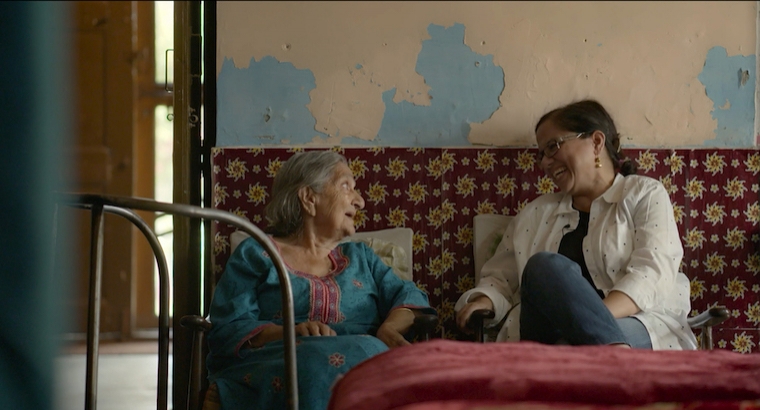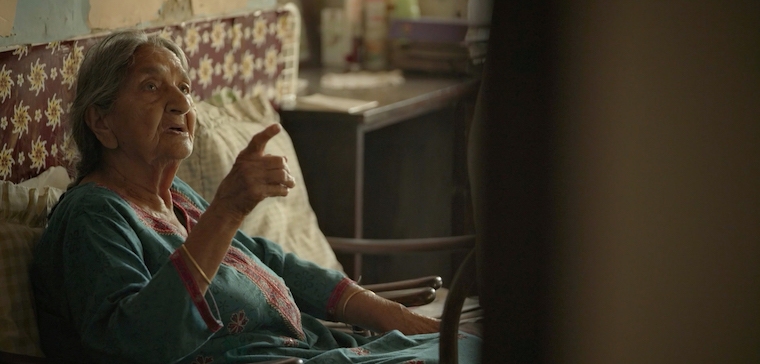

'Human emotions were there before stories were told and will be there long after filmmakers are gone,' says Tanuja Chandra, whose first documentary Aunty Sudha Aunty Radha, is based on the lives of her two aunts aged 86 and 93 and how each day in the village of Lahra is a celebration of a time that has both come and gone. It’s a unique tale of sisterhood, of two fearless widowed women who understand the true essence of life. Their strength and lack of fear is inspiring and Tanuja’s documentary gives a new lens to look at an age old perspective on old age.
We got in touch with the filmmaker and writer to know more about her streak of building strong female characters.
Having worked on a large variety of scripts, ranging across different mediums - features, series and documentaries, how would you now define your creative sensibility?
In many ways, I feel I've hit upon my true sensibility now after writing and directing several films. Aunty Sudha Aunty Radha, being my first documentary, was a great learning experience, in arriving at that. I want to tell human stories, primarily of women (that hasn't changed from the start), whatever the genre - comic, drama, thriller. Realistic storytelling engages me thoroughly. Real characters, real and surprising plot developments, these are eminently intriguing to me. Real life is the most unusual, it follows no script, so while the actual writing of a screenplay would be carefully thought out, the way it would play out ideally, would have the freshness, the unexpectedness, the awkwardness, the stumbling and the fumbling, the flaws as well as the grace and sweetness of real life. Underneath it all, if I'm lucky, it would have some amount of wisdom and love that one experiences in a lived life.
When did you first learn that you wanted to be a filmmaker? How did you work towards making that possible?
I always loved stories, I enjoyed reading. However, I didn't love films when I was little. I wanted to be a journalist because real stories always grabbed my attention. Plus I felt that telling stories about real people corrected the injustices of the world in some small way. However, I soon fell in love with movie-making, I went to film school in the US in order to create a sort of foundation of leaning but was always sure I wanted to make movies in India. I joined television as soon as I returned, that was the time when Satellite TV in India was fast becoming popular, and after a stint of a few years, I co-wrote some well-known films, till I was ready to direct my own! So, I guess you could say, I've climbed the ladder the proper way, right from the basics to being what they call, 'Captain of the ship!' That said, I must add that one needs to keep adding to the well of one's experience and knowledge, keep reading, keep watching films and series, keep learning from people all over the world.

FILM STILL
Which films and filmmakers have shaped you and your work?
All kinds, really. The great filmmakers that the world reveres -- from their films to independent films, I enjoy stories that touch a human truth. That have strong plots, but also speak about the mystery, allure, wonder, confounding ways and pain of human existence itself. I often say to people that for me creativity itself is a thing to admire and be amazed by! That an evocative story exists where there well could have been nothing. I feel even the smallest act of creating something is worthy, it connects people, it transcends national and language barriers, it creates empathy. Is this short of miraculous!

FILM STILL
How was working on a documentary different from your earlier work? How was it to shoot real life characters?
I have great regard for this medium, it's beautiful to watch people, especially so-called ordinary people, tell an account of their own lives without pretense. My aunts by now, at the ripe age of 86 and 93, completely lost all interest in pretending! Which is amazing to behold. In documentaries, you can have a loose script or even a pretty solid one, but you can't be sure that what your camera captures will go according to script. It's real life after all, it can go in any direction! "Scenes" can play out according to the way the people in them wish to be. That's a lot of fun but also challenging. So I tried steering my chats with my aunts in a certain direction at time but mostly this was of little use. They would speak of what they wanted to, in the rhythm they wanted to, there would be talk, then there would be silence - the director has little control in these situations. The camera is fluid, the two people behind the cameras would go wherever they pleased, capture frames that their eyes found appealing, the more dense, the better. The challenge sometimes is to keep the crew out of the paths of the cameras! So in a documentary the crew members have to be very sensitive to what is going on, to what is being spoken, and they have to be ready to follow and go wherever the 'characters' go. It's amazing!

FILM STILL
What inspired Aunty Sudha Aunty Radha?
I've wanted to make a film on my aunts for a while, it was my mother who gave me the idea first. My aunts would invite me to their village every year, but I'd usually be too busy to go. My parents would visit in the winters and come back with such fun stories that I felt this was an account worth filming. When I finally did visit them, it was with my small crew who felt very welcomed by my aunts. We also relished the food a great deal - fresh vegetables straight out of the farm in front of their house, cooked with love and care, it was delicious, North Indian food. This film means a lot to me not just because it's personal to me, but also because this is a way of life that's not going to be there for long. I felt it was something I had to capture because it has a nostalgic value and it's a simple kind of lifestyle that's fast disappearing. And the fact that viewers have adored my aunts, thrills me. I'm so glad my producer agreed to back this little story and my crew came along out of affection for the story.
On one level, Aunty Sudha Aunty Radha comes across as a journey that is nearing its end, and yet has just begun, it highlights the good aspects of old age. What did you intend on the readers to take back from their story? What are the most important lessons you learnt from your aunts?
Yes, it's about a journey that's about to end as well as about things like relationships, love, and even our human flaws, things which are without an end. Human emotions were there before stories were told and will be there long after filmmakers are gone. If viewers laugh and feel empathy and they leave with warmth in their hearts, that'll be a great earning for me and my team. There were some people who after watching the film, longed to be with their grandparents or parents who lived away from them, and there was one who even made the trip a couple days later!
I've learnt many lessons from my aunts and the elders in my family, but the most important one by far is how to look at death with grace. These ladies aren't in the least, fearful of death. Neither are they obsessed with it. It'll happen when it happens, they say, and until then, they will live with glee and enjoyment. Now, that's no small lesson!

FILM STILL
A word of advice for aspiring filmmakers.
Just go ahead and tell stories. The time will never be perfect, so just do it. You may not make the most brilliant film ever made (unless you do) but it'll be a story ONLY you can tell, if you tell if truthfully. There is nothing coming in your way - go ahead and put a piece of your heart on paper or on the screen. That said, I must add - integrity is the most important asset any individual can have. Do all work with integrity.
These are unusually challenging times, how has the pandemic affected you personally?
In this time of global confinement, I've of course been at home now for the last two months, something that has never happened in mine or anyone else's life! However, I would hate to make my own, rather privileged experience of this crisis, seem overly precious or speak about my own inconvenience. I've had the comforts of my home and have been in touch with friends and family. So, it would be very wrong of me to complain. My preparatory work on my next projects did come to a standstill, but I've had writing work to do. So I've tried to keep myself busy with that. While of course getting in a bit too much rest and quiet time. Also, while we speak of our experience, it's very important to mention the unimaginable suffering and grief that the poor and the displaced have gone through. To my mind, we've collectively heaped together more sorrow than we might be able to shed. It's a monumental tragedy. I can only hope that we'll all work together to fix things once the hard part of the crisis is over.
What according to you will be the new normal for your industry post the pandemic?
This has been a huge inflection point for not just ours, but all industries. Whatever I say about the future will be hypothetical, in part at least. Going ahead, we don't know what exactly we should be preparing for, since the virus isn't anywhere close to coming under control yet. So while film production crews may begin assembling with all possible precautions, in small groups, shooting will be a very difficult thing to navigate. Shooting units are large and even if we can maintain distance and hygiene in the crew, keeping that kind of distance between actors amidst all the action in front of the camera will be a huge challenge. All scripts will need some revision for sure. As for theatres, they aren't going to get crowded with audiences anytime soon. This will of course be a big blow to the business, but then we will have to adopt a new approach for just about everything in life, it seems.